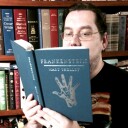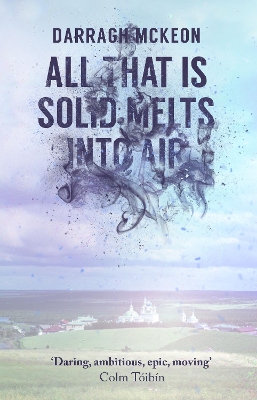
Michael @ Knowledge Lost
Written on Sep 24, 2014
Most people who know me know that I am a fan of Russian literature and books set in Russia. The Cold War years are of particular interest to me, the social and political unrest makes for a haunting backdrop for great story telling. When I head that All that is Solid Melts into Air was this year’s answer to A Constellation of Vital Phenomena, it was all I needed to buy this book. While reading the book I found out the novel centred around the Chernobyl nuclear accident which just gave that extra element to turn this into a new favourite.
I have never read a novel about the Chernobyl disaster before and I am struggling to think of other books that focus on this historical event. So I was pleased to have a new insight on a situation I hope to never experience. This was a beautiful and haunting tale of Russians living life and the connections they make along the way. However little gems like the controversial idea of implementing safety measure pre-disaster and the Soviet Union’s efforts to cover the accident up really helped make this novel great.
The title is taken from a line in The Communist Manifesto, which is quoted before the novel kicks off. This is an interesting quote to add, not just to give a reference to the title but the implications of what to expect within the novel. As Karl Marx and Friedrich Engels theorise in their political manifesto, “The history of all hitherto existing society is the history of class struggles”.
“All that is solid melts into air, all that is holy is profaned, and man is at last compelled to face with sober senses, his real conditions of life, and his relations with his kind.” – Karl Marx (The Communist Manifesto)
While this is a strong character driven novel, it is not the personal but political transgressions that stood out for me. All that is Solid Melts into Air is set in a time where the Iron Curtain is beginning to collapse; things are drastically changing and then the disaster involving the Chernobyl Power Plant throws the people into civil unrest. While the book focuses on a few characters the overall theme is one of class struggles. The Russian people struggling against the Soviet government; the fear and repression rules stronger than the radioactive atmosphere. An interesting concept considering the communist society that Marx wrote about was nothing like the political government at the time.
I am a little sad to see this gem has remained under the radar; All that is Solid Melts into Air deserves so much more attention. Despite that horrific setting, this is a novel of great beauty with visceral portrayals of both people and places. The struggle the people go through is handled with tender care and empathy. It is hard to believe that Darragh McKeon is a debut author; much like Anthony Marra, I am eagerly awaiting his next novel. All that is Solid Melts into Air is a new favourite and you can expect it to be near the top of my ‘best of 2014’ list.
This review originally appeared on my blog: http://literary-exploration.com/2014/10/28/all-that-is-solid-melts-into-air-by-darragh-mckeon/
